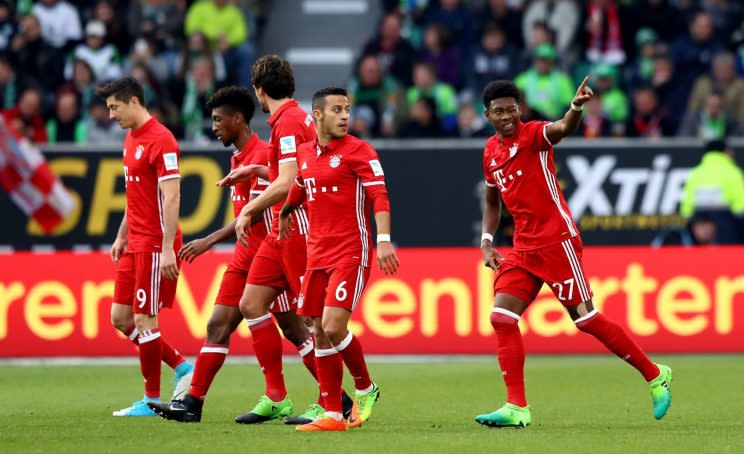Bayern Munich clinches fifth consecutive Bundesliga title, concludes yet another chapter of dominance

Bayern Munich has won the Bundesliga title. Again.
That particular sentence has gotten remarkably repetitive over the past five years, and that’s because of how remarkably dominant Bayern has been. The German giants clinched their fifth consecutive crown with a 6-0 thrashing of Wolfsburg on Saturday. It’s their 10th title in the last 15 years, 14th in the last 21, and 26th since the inception of the Bundesliga in 1963.
The magnificence of those numbers can get lost in the monotony of Bayern’s domestic success, in the inevitability of each successive title, in the lack of a clear and consistent companion at the summit of German soccer. But it should not be lost. The numbers have not been matched around Europe over the past two decades. Not in England, not in Spain, not in Italy. Not in France, not in Portugal, not in any other comparable league.
Munich’s 2016-17 season featured plenty of disappointment. Its cup chase ended with a semifinal collapse against Borussia Dortmund. Its European dreams were dashed in a classic quarterfinal tie against Real Madrid. But the Bundesliga is Bayern’s; has been Bayern’s; will be Bayern’s until something drastic changes.
In a way, Bayern’s dominance has sucked intrigue out of the Bundesliga in recent years. The gap at the top of the table this year is 10 with three matches to play; Bayern’s goal differential is 32 better than its closest competitor.
In fact, the title-winning margin has never dipped below double digits over the past five seasons. Last year, the gap between Bayern and third-place Bayer Leverkusen was 28. In 2013-14, the gulf between Bayern and second-place Dortmund was 19. In 2012-13, it was a mind-boggling 25; Bayern’s goal differential that year, 80, was not only 41 better than the next best; it very nearly eclipsed the goals for total of every other club (Dortmund scored 81).
But while the battles for the Bundesliga have been boring, Bayern’s success has elevated the league. Dortmund has pushed the Bavarian superclub, and has become a force in its own right in Europe. Leverkusen, Schalke and Wolfsburg have played in multiple Champions League knockout ties since Bayern’s first of five domestic titles. This year, newly-promoted RB Leipzig emerged as a burgeoning challenger.
It was big-spending Leipzig who were the biggest threat to Bayern’s run for most of the season. And it was Leipzig who came into the fourth-to-last weekend of the season in second place, within eight points of Munich. But Leipzig’s fading title hunt fell by the wayside when it failed to crack open Ingolstadt and stumbled to a 0-0 draw earlier on Saturday. That left the door open for a Bayern celebration, and Carlo Ancelotti’s men secured the party with ease.
The title-winning goal, officially, came from David Alaba, who curled a free kick over the wall and in at the near post in the 19th minute:
Is this the title-clinching goal for @FCBayernUS? David Alaba with a beauty! #WOBFCB #Bundesliga https://t.co/BM3c3ruGXT
— FOX Soccer (@FOXSoccer) April 29, 2017
But the goal wasn’t overly dramatic, because the result — of the game, and of the title race — was never really in doubt. Robert Lewandowski padded the lead after 36 minutes with an emphatic finish from the top of the box:
Lewandowski's 40th goal of the season (all comps) brings Bayern closer to yet another #Bundesliga crown. #WOBFCB https://t.co/11bE0VNvoI
— FOX Soccer (@FOXSoccer) April 29, 2017
From there, the romp was on. Lewandowski made it 3-0 just before halftime. Arjen Robben, who can still elevate himself to unstoppable levels at the age of 33, banged in a fourth with a customary left-footed strike in the second half.
Luis Gustavo’s second yellow card for Wolfsburg made the match even more one-sided late on. Thomas Muller calmly tapped in a fifth on 80 minutes. Joshua Kimmich added a sixth five minutes later.
The celebrations at the final whistle were understandably subdued. They were special for a few, including Phillip Lahm, who will retire at season’s end. Lahm led the players and visiting fans in some chants after the match. But for many, the postgame festivities were merely a formality, just like a the fifth-consecutive title was a month ago.
With the Bundesliga now locked up, Munich’s season is effectively over. Its run atop the German soccer world, however, is anything but.

 Yahoo Sports
Yahoo Sports 

